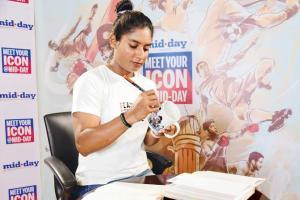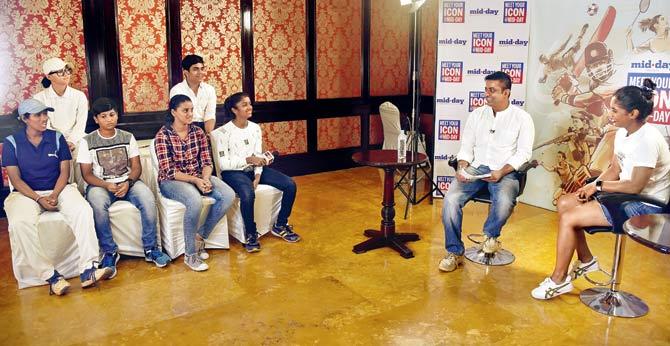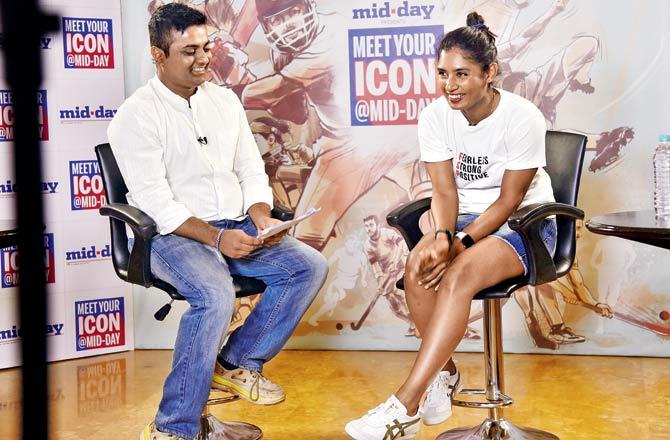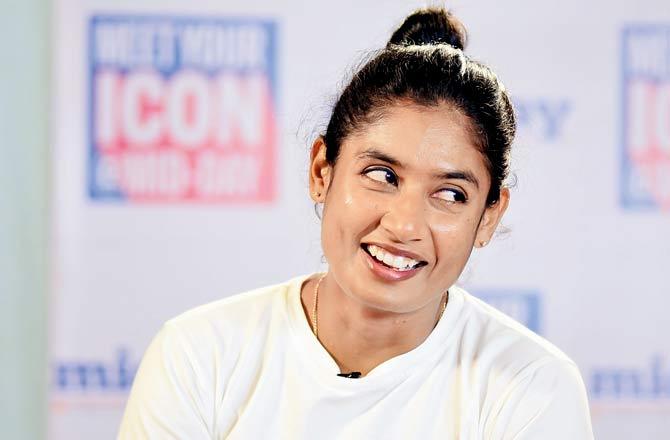Swashbuckling batswoman Mithali Raj dwells on the factors that worked to make her India's most celebrated woman cricketer

Mithali Raj
Fearless. Strong. Positive. These words printed on Mithali Raj's T-shirt perfectly sum up India's most celebrated women's cricketer. Probably, the words make up her success mantra as well. It is the supreme combination of skill and optimum state of mind that has helped Raj reach the pinnacle of her sport. Next June, Raj, who is just three short of 200 ODI caps, will complete two decades in international cricket after carving a century on ODI debut v Ireland at Milton Keynes in 1999. Along the way, she has shattered several records. Her latest feat was becoming India's highest T20 scorer [105 v Australia 'A' on October 24]. Before the Indian team departed for the ICC World T20 in the Caribbean, Mithali took time off to appear on mid-day's Meet Your Icon at the Mumbai Cricket Association Recreation Centre in Bandra Kurla Complex. Mithali, who turns 36 on December 3, got candid about her cricketing journey, revealed her biggest secret and plans for the future.
ADVERTISEMENT
Excerpts:
Almost two decades in international cricket. Take us through your journey.
Before women's cricket came under the BCCI, playing under the WCI (Women's Cricket Association of India), was a huge challenge in the 1990s as far as financial status was concerned. As a board, it wasn't very sound. We could not have regular tours or matches. I remember in 1999, the year I made my debut, we just had one tour — to England. In the next year, I toured New Zealand for the World Cup. Today, youngsters who made their debuts in South Africa in January [this year], are part of the World T20 team. [Earlier], they probably would have had to play 20 to 25 games before the World Cup. So, the exposure for a youngster back then was low compared to now. We are centrally-contracted now, so the players can focus on preparing and have a professional approach towards their sport. In the 1990s, the first thing to do was to find a job, so that you could secure yourself financially. Under the BCCI, we can walk in to train anywhere. And then, under the WCI, getting a match at a stadium was a huge thing.

Mithali Raj chats with mid-day's Harit Joshi and her fans at MCA Recreation Centre in BKC. Pics/Pradeep Dhivar, Rane Ashish
You have achieved almost everything on the cricket field. What keeps you going?
I don't know what keeps me going (laughs). All I know is I enjoy batting. A sportsperson's career is quite short as compared to say, a lawyer or a doctor, so I am just trying to play as many games to the best of my ability. When you represent your country, you cannot forego even one per cent of your commitment towards working hard. I believe I have another year or two before I can hang my boots. I am working extremely hard on my fitness too.
Watch Mithali Raj speak about her early days as a cricketer:
One of the features of your batting is composure. How did you develop the quality?
I played a lot of corporate matches when I was very young. That's the plus point of playing in the 1990s. Though the number of matches in domestic cricket was low and international [games] were hardly held, the Andhra Pradesh Women's Cricket Association (APWCA) and TN Pillay [former official] used to send a women's team entry for every corporate invitation tournament. Though the standard would not be very great since corporate people play for the love of the sport, for players like us, those matches helped us understand how to deal with different situations. Bowlers there were very random and would often come up with weird actions. But then, as a batter, you have to try to pick through those actions. Sometimes, you had to play on very bad grounds. You did not have a choice and the wicket was either under-prepared or you played on matting tracks. Those hard days gave me a platform to work on my temperament.

When you started playing cricket in the 1990s, the mindset of girls playing sport wasn't what it is now. What was your motivation to take up cricket?
Cricket was never my first choice. I never wanted to be a sportsperson. It just happened. It was destiny. Iniially, I was into dance and learnt Bharatnatyam for eight years. I appeared on various TV shows. Cricket happened because my father (Dorai Raj) is an ex-Service man and my brother was a cricketer. He played at the school level. I love sleeping and to inculcate the habit of early rising, my dad forced me to take up a sport. That was the only reason I started playing cricket in the first place. And thereafter it continued.
You were the youngest member of the Indian team when you made your debut in 1999. You went on to lead the side that had a lot of senior players. How did that transition take place?
There was no international tour for two years when I made my India debut in 1999. The likes of Jemimah Rodrigues or Pooja Vastrakar… they have 20 games under their belt. I never had that kind of exposure. If I have to compare a 16-year-old Mithali with the current lot, they would be far ahead in terms of the way they prepare and their professional approach. I was 21 or 22 when I led India in 2005. I doubted whether I would be a good leader. I was leading the team in the biggest event — the World Cup — without much experience. But the seniors were very helpful. I didn't have much to do as captain apart from putting the strategies in place or setting the field. Coming to 2017, as the most experienced player, I worked very hard in getting the players together. For most, it was their first World Cup. There are a few similarities. In the 2005 World Cup, no one gave us a chance. In the 2017 World Cup too, people wrote us off. In the 2005 World Cup final, there were hardly any people in the stadium and the matches were not televised. In 2017, thanks to social media, we had a lot of people tweeting and writing about our journey. And the final was the most-watched women's game in history. In 2005 when we lost, I saw seniors crying. As a young captain, I could not relate to the emotions of it being the last World Cup for them. When we lost the 2017 World Cup final, I cried too. Nevertheless, it has set the ball rolling in India, where girls have started to take up the sport. Women's cricket is now a viable career option. Every player is some sort of a brand in the market today.
The pay factor is the most talked-about aspect of women's cricket...
Unless there is branding, players will not get adequate payment. Why do we want matches to be televised? Why do we want people to turn up for our matches? That's how you will generate revenue. After the 2017 World Cup, there was a hike in our [central] contracts. We have also seen players signing up for brands. It's a journey. Even the men's team, at one point, were not earning
as much.
What will you do once you retire from cricket?
As long as I am fit and performing, I will continue to play. [Later] I may look at mentoring youngsters. You have a lot of coaches and physios, trainers etc, but it is important to guide youngsters to focus because you have so many distractions. Back then, as a 16-year-old, I didn't have much [distractions]. I didn't have Twitter, FB [Facebook] or Instagram. But today's youngsters, as soon as they finish training, are with their mobiles. Also, the pressure is so huge that sometimes they crumble.
We have seen stories of grit emerge from the MeToo movement across India. Do you think the sports fraternity would uphold women's rights if an allegation was made?
One should not make an opinion about anybody's capabilities based on gender, caste, creed or social status. Everybody is blessed with ability and if deserving, they should be given optimum opportunities. It's very sad the way a lot of names have come out… some very big names. People, who are in a stronger position, are trying to take advantage of the weaker lot. It does not really show their strength. It reflects how the mind is and how low that person can go. I also sense that there are a lot of cases that do not have authenticity. There are many anonymous people who are tweeting too. If you have gone through an experience, it is quite disturbing for a person. As a woman, I feel quite disturbed. But if you have the courage, you should be brave enough to come out with your identity. You don't have to justify to the world what you have faced, but by coming out, if it lessens your pain, then you should come out. It is a very sad thing, but with so many cases coming out, women are becoming bolder and brave, which is good.

'Dad still doesn't know this'
I was apprehensive [about captaincy] because in 2003, when the selectors asked me to lead India, I refused because I wasn't ready. My dad had told me before leaving for the tour that he felt that the selectors might make me the captain. 'Don't refuse,' he said. But I knew as a player that I wasn't ready for it and I don't think I've told him that I refused it. He is going to learn about it through this interview.
Catch up on all the latest T20 news and updates here. Also download the new mid-day Android and iOS apps to get latest updates
 Subscribe today by clicking the link and stay updated with the latest news!" Click here!
Subscribe today by clicking the link and stay updated with the latest news!" Click here!






